
Biomimetics: Learning From Nature | Freshman Class Raises the Academic Bar | A Capitol Commencement
| Elliott School Adds More Middle East Programs | Student Blogs Capture Campus Life | GW to House Teamsters Archive
| Bender, Amsterdam Gifts Set Pace As Trachtenberg Legacy Fund Tops $16.5 Million | Law School Receives $5.1 Million for New Competition Center
| George Welcomes | Elliotts Support International Affairs Education | Cancer Gala Honors Outstanding Supporters
| A
Faculty for Writing

Biomimetics: Learning From Nature

|
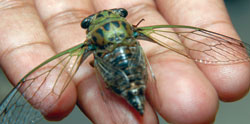
Professor Rajat Mittal holds a cicada in the new insect flight analysis laboratory of GW’s Center for Biomimetics and Bioinspired Engineering.
Jessica McConnell
|
Birds, insects, and fish have some amazing tricks to teach us. Just ask Rajat Mittal, professor of mechanical and aerospace engineering and director of GW’s recently established Center for Biomimetics and Bioinspired Engineering (COBRE).
“Some fish travel at amazing speeds but can also turn virtually on a dime,” he says. “The dragonfly can fly forwards, backwards, and sideways, and can also hover in place, all with relative ease. What is it that allows these creatures to accomplish these amazing feats?”
COBRE, launched in May as a new University signature program, is built upon the premise that despite technology’s many wonders, nothing outperforms nature. “Nature’s solutions are smart, energy-efficient, agile, adaptable, fault-tolerant, environmentally friendly, and multifunctional,” Mittal says. “Through biomimetics, we strive to transfer nature’s technologies, design principles, and solutions into our engineering designs.”
Mittal entered the rapidly growing discipline in 1999, when it was in its infancy. His first biomimetics project involved using computer simulation to examine how insects fly. “The science of insect flight was just beginning to draw interest from the Department of Defense, and I was in the right place at the right time with the right tool,” he says.
Shortly after coming to GW in 2001, he joined forces with Harvard and MIT researchers on a five-year Navy project to design a biomimetic fish fin capable of propelling autonomous underwater vehicles. Mittal then switched gears to lead up a high profile, three-year research project in collaboration with USA Swimming to improve the stroke techniques of top U.S. competitive swimmers headed to the 2008 Olympics in Beijing.
The excitement generated by these projects led in large part to the establishment of COBRE as a GW strategic initiative. The multidisciplinary center is earmarked to receive substantial funding over the next several years through a $4.5 million endowment payout.
“By getting involved in this exciting field at a relatively early stage, GW has the chance to make a major contribution and become a leader in the area of biomimetics and bioinspired engineering,” Mittal says.
The possibilities are awe inspiring. Take, for example, COBRE’s projects analyzing the flexibility of fish fins and the aerodynamics of dragonfly wings. According to Mittal, the center’s findings could be integral to the development of autonomous underwater vehicles and micro aerial vehicles—tiny flying machines which will ultimately be used for surveillance missions, environmental monitoring, and disaster recovery efforts.
“Eventually, every soldier will carry one of these tiny flying surveillance devices that they can launch, almost like a swarm of locusts, into war zones to take photographs without putting soldiers in harm’s way,” Mittal says. The minuscule vehicles could also be flown into the rubble of earthquakes to search for survivors.
COBRE is in the process of setting up an insect flight analysis laboratory to observe and analyze flying insects under controlled conditions using high-speed photography and precision metrology. In a related project, GW researchers will focus on developing precise measurement techniques for biological systems in order to understand the design of the internal systems of living creatures. GW undergraduates are participating in most of these projects through summer research fellowships granted by the center.
“The time for bioinspiration as a science has really come,” Mittal says. “The future is going to be incredible.”
—Jamie L. Freedman
Freshman Class Raises the Academic Bar
GW welcomed 2,150 of the nation’s best and brightest incoming freshmen this fall. This year’s freshmen also set a University record for the most selective admittance rate. GW received 19,518 applications, of which a record low 36 percent were accepted. This year’s freshman class is fewer in number than years past and is consistent with the University’s desire to be more selective as well as to slightly reduce the overall size of its undergraduate student population.
“The quality of the entering freshmen reflects GW’s growing reputation as a premier university that attracts exceptional students from across the nation and around the world,” President Steven Knapp says. “The class of 2011 is the first I will have the privilege of welcoming to GW’s lifelong and worldwide community, and we are all excited by the prospect of their arrival.”
The University continues to attract a geographically diverse student population with freshmen hailing from 47 states, the District of Columbia, Puerto Rico, the U.S. Virgin Islands, and more than 40 countries. Nearly 30 percent of the incoming students represent multicultural backgrounds, making the class of 2011 one of the most diverse in GW’s history. |
A Capitol Commencement

|
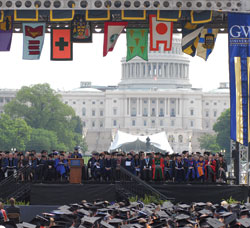
GW’s Commencement drew more than 20,000 to the National Mall on May 20.
Jessica McConnell
|
With the majestic U.S. Capitol as a backdrop, more than 22,000 GW graduates, family members, and friends celebrated the Class of 2007 at the University’s Commencement, held May 20 on the National Mall.
Commencement speakers—including honorary degree recipients Wolf Blitzer, Ralph Cicerone, Linda Cropp, Harvey Fineberg, and Lowell Weicker—offered words of wisdom, emphasizing the need to seize opportunities, appreciate life and loved ones, and never stop learning.
CNN anchor Blitzer, who had reported live from the scene of the April shootings at Virginia Tech, said the tragedy served as a poignant reminder of “how fleeting life can be and how a split second can change everything.” He urged the graduates to cherish their family and friends and to strive to make the world a better place.
Cicerone, president of the National Academy of Sciences; Cropp, former District of Columbia council chair; Fineberg, president of the Institute of Medicine; and Weicker, president of the nonprofit Trust for America’s Health and a former U.S. senator and Connecticut governor, spoke separately about the challenges facing America’s youth.
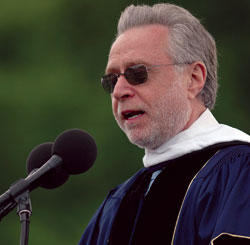
CNN anchor Wolf Blitzer was one of five honorary degree recipients to address the outgoing class. Blitzer was awarded a Doctor of Humane Letters.
Thomas Kohout
|

|
“Reality calls all of us—parent, student, teacher—to the courageous acts required of our times. No exceptions, no deferments,” said Weicker, who was presented for his honorary degree by one-time congressional colleague Sen. Daniel Inouye, JD ’52 (D-Hawaii).
The ceremony, Stephen Joel Trachtenberg’s last at the helm of the University, served as the president’s formal farewell to the GW community. For the second consecutive year, Commencement was held on the National Mall due to construction at the Ellipse. Gray skies gave way to a brief spring shower, but it didn’t dampen spirits. Cheers and applause greeted student speaker Catherine O’Connor, BS ’07, as she reflected on her service as an Iraqi war veteran.
“While it’s often daunting to take risks, it’s even scarier to not be able to mold to the changes that life throws at you,” O’Connor said. “Don’t wait for the mere chance that greatness will find you. Go out there and demand it.”
—Rachel Muir

Elliott School Adds More Middle East Programs
The Middle East has long been regarded as a major—and very sensitive—center of world affairs. A series of new programs will catapult GW’s Elliott School of International Affairs far beyond the front-page headlines, fostering an in-depth understanding of this critical region among students and international affairs professionals.
“One of the Elliott School’s top priorities this year is to build on GW’s existing expertise on the Middle East by launching several interconnected institutional initiatives on this important part of the world,” says Michael E. Brown, dean of the Elliott School.
A cornerstone of the effort is GW’s new MA in Middle East Studies, directed by Nathan J. Brown, professor of political science and international affairs. The interdisciplinary, two-year program that welcomed its first class this fall delves deeply into the Middle East’s culture, development, history, and politics, preparing students for careers in government, the private sector, and international and nongovernmental organizations.
The curriculum blends theory and practice and draws from a wide range of academic disciplines. Students select one of 10 areas of expertise to focus on, ranging from conflict and conflict resolution to international economic affairs. Rounding out the program are a variety of elective courses, including the Arab-Israeli conflict, global Islamic feminism, U.S. policy in the Gulf, and imperialism in the Middle East. Degree candidates must also gain an advanced level of proficiency in a modern Middle East language.
In a parallel initiative, Nathan Brown also directs GW’s newly formed Institute for Middle East Studies, a research organization that sponsors conferences, workshops, public lectures, and faculty and student research related to the Middle East. “It’s not an accident that both the MA program and the institute were launched at the same time,” says Brown, one of GW’s most accomplished and acclaimed Middle East scholars. “We now have a critical mass of scholarly interest on the Middle East at GW and we’re all hoping that the institute will become widely recognized as a center people can turn to for analysis and understanding of issues related to this politically-charged region.”
This past spring marked the beginning of another high-profile Elliott School endeavor—the Middle East Policy Forum, directed by Ambassador Edward W. Gnehm Jr., BA ’66, MA ’68, Kuwait Professor of Gulf and Arabian Peninsula Affairs. The forum supplements the MA program’s curriculum by bringing leading scholars, analysts, journalists, diplomats, and policymakers to campus to discuss current and emerging trends in the Middle East. Highlights of the forum’s inaugural semester included lectures by former U.S. President Jimmy Carter and Israeli Ambassador Sallai Meridor.
“We’re delighted to be able to give our students the chance to engage directly with key figures who have notable reputations on Middle East issues,” says Gnehm, who served as U.S. Ambassador to Jordan and Kuwait during his distinguished 36-year diplomatic career. “A lot of our students say that this is why they came to GW and to Washington.”
—Jamie L. Freedman

Student Blogs Capture Campus Life
When he wasn’t learning to weave Kente cloth or perusing open air markets, international affairs major Christopher McLaurin found time to tell prospective GW students about his study abroad experience in Ghana.
He toured the countryside, tasted exotic cuisine, and fed bananas to some of the nation’s native monkeys, all while interning for a nonprofit organization and completing a semester of classes.
“Study abroad isn’t all about studying,” he writes in an online account.
McLaurin, now a senior at GW, is one of several Colonials chosen to detail their college life experiences on an Office of Admissions-sponsored blog (or Web log) aimed at prospective students.
The blogs are GW’s newest attempt to provide a personal touch to its academic-focused admissions information. When it launched during the spring semester, six students of eclectic backgrounds, ages, and interests—including a senior ballet dancer, a freshman Republican, and a junior music lover—posted advice and information on the Office of Admissions’ Web site about living and learning at GW. University officials say the candid portrayals of the school, with snippets about everything from clubs and sports to pulling all-night study sessions in Gelman Library, give prospective students an accurate representation of campus life.
“A lot of kids these days are going to the Web site to get their information and don’t even visit or talk to us,” says Kathryn Napper, executive dean of the Office of Admissions. “So you need to put as much complete information as you possibly can on the Web. This is just another way to highlight the exciting things that our students are doing.”
In addition to periodic postings about his experiences traveling around Ghana, McLaurin used his blog to tell prospective students about his favorite GW professors, the advantages of finding an internship in the nation’s capital, and his study habits.
“So while I do not recommend all-nighters, they can pay off,” McLaurin writes in a February entry, describing how he wrote five papers before watching the sun rise on the Lincoln Memorial.
As a returning blogger this fall, McLaurin says he plans to add a taste of senior life, waxing nostalgic on his academic and social involvement at the University and detailing the inevitable transition from student to future professional.
The Office of Admissions is hoping that this type of candor will be successful in reaching out to potential Colonials beyond the school’s mainstream marketing material.
“No one in our office reads the blogs before they’re posted. They have free rein, and I think that gives more legitimacy to what they’re saying,” says Kristen Kaczynski, a senior assistant director of the Office of Admissions who helps run the program. “Our prospective students are looking for the real story, and that is the way to get it to them.”
—Jaime Ciavarra

GW to House Teamsters Archive
GW will now be home to one of the nation’s most preeminent collections of labor history memorabilia.
The International Brotherhood of Teamsters has contributed $2 million to the University to create an endowed archivist position at GW and to establish an exhibition of its archives for public display, helping to enhance research on 20th-century U.S. labor relations. The Teamsters archives, which date back to the early 1900s, will reside at GW on permanent loan. The funding is the first part of a comprehensive labor history education project in cooperation with the University.
The archives include presidential papers from James R. Hoffa and James P. Hoffa, autographed political cartoons from the early 20th century, and several hundred photographs and memos from the labor and civil rights movements, such as a photo of Hoffa with Martin Luther King Jr. and telegrams from President Franklin D. Roosevelt.
The archives also contain a 1930s-era wire recorder believed to be one of the few remaining in the world. Many of the documents, letters, and photographs in the archives have never been seen by the public. The archivist will be responsible for cataloging the archives and acquiring additional historical labor documents through GW’s Gelman Library System.

Bender, Amsterdam Gifts Set Pace As Trachtenberg Legacy Fund Tops $16.5 Million
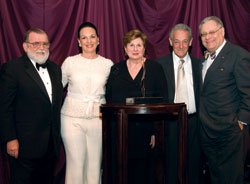
Morton and Grace Bender and Philip and Gail Amsterdam honored President Emeritus Stephen Joel Trachtenberg with $5 million gifts at the gala in May.
Dave Scavone
|

|
More than $16.5 million has been raised in the last three years to support the Stephen Joel Trachtenberg Legacy of Excellence Campaign to honor the former president’s leadership of The George Washington University.
The successful legacy campaign was fueled by commitments of $5 million each from longtime University benefactors Morton and Grace Bender and Philip and Gail Amsterdam. More than 250 faculty, staff, alumni, and friends contributed to the fundraising effort.
The Amsterdams and Benders announced their gifts at a May 17 gala held in honor of Stephen Joel Trachtenberg and Francine Zorn Trachtenberg. Other lead gifts announced that evening included a $1 million commitment by Albert Wang, a resident of Taiwan whose daughters attend GW, and $500,000 from Thaddeus “Tad” Lindner, BA ’51, DPS ’94, and Serge Gambal, BA ’52, co-founders of Colonial Parking. More than 500 guests attended the event at the Mandarin Oriental Hotel.
Bender and Amsterdam chaired the Legacy Campaign committee. Other members were Lindner; I. Allan From, BBA ’72; Gary Granoff, BBA ’70, JD ’73; and Robert G. Perry, BS ’70.
Gifts to the Legacy Campaign support the newly named Trachtenberg School of Public Policy and Public Administration, which, since its inception in 2003, has established itself among the nation’s leaders in the field. More than $3 million was raised through the Legacy Campaign to endow a new chair named for Trachtenberg, the University Professor of Public Service.
GW Vice President for Development and Alumni Relations Laurel Price Jones lauds Amsterdam and Bender for taking the lead as both donors and campaign committee chairs. “We are very grateful for all the work and the many hours the committee members put in working on lists and calling people. I’m especially grateful for their own gifts,” she said. “Thanks to their generosity, the Trachtenberg School is on a trajectory for continued excellence in the years ahead.”
Campaign funds support the Stephen Joel Trachtenberg Scholarship program, providing scholarships for outstanding D.C. public school students, allowing them to attend GW. A special campaign was launched in honor of Francine Zorn Trachtenberg to support a photography fund in her name. The campaign raised more than $100,000 in recognition of her contributions to the University and her passion for art history, especially the history of photography.
—Jamie L. Freedman
Law School Receives $5.1 Million for New Competition Center
A multimillion-dollar lawsuit settlement will result in a new Law School center, thanks to the help of a GW alumnus.
This summer the University received a $5.1-million cy pres award to endow a Center for Competition Law at the Law School. The award is a portion of a class-action settlement in the case of Diamond Chemical Company Inc. v. Akzo Nobel Chemicals B.V. and Atofina Chemicals Inc., et al., a successful antitrust lawsuit brought by attorney Michael D. Hausfeld, JD ’69, alleging global price-fixing schemes. Hausfeld specializes in antitrust and international law at Cohen, Milstein, Hausfeld & Toll PLLC, and is considered one of the country’s top civil litigators.
A cy pres award, meaning “next best use” in Latin, is awarded when full restitution to all injured parties in a class-action lawsuit is impossible or infeasible. Instead, the funds are used in a way that indirectly benefits the parties.
In his argument for the cy pres award, Hausfeld said the center will focus on the novel and special challenges to traditional antitrust enforcement due to the globalization of markets, and deterring the formation of international cartels that harm U.S. consumers.
Hausfeld says the University is forging the way for this emerging field.
“I have no doubt the center is going to play a central role in developing that area of law,” Hausfeld says. “The center is in a unique position of pioneering and influencing practice in the field.”
The duties of the Center for Competition Law include sponsoring and conducting research into competition law and its private enforcement; organizing conferences for judges, executive officials, academics, and practicing lawyers; serving as a resource to promote private enforcement in competition law in the United States and abroad; and enhancing the skills of current and future private practitioners of competition law. |

George Welcomes
 
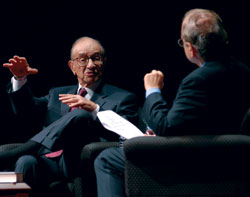
Former Federal Reserve Board Chairman Alan Greenspan spoke about the effect of globalization on the American economy during a Sept. 19 event at Lisner Auditorium. The conversation, moderated by Pulitzer Prize-winner Daniel Yergin, centered on Greenspan’s new book, The Age of Turbulence: Adventures in a New World.
Jessica McConnell
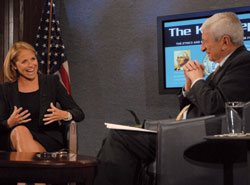
Katie Couric, managing editor and anchor of The CBS Evening News, discussed democracy and the press with vGW Welling Presidential Fellow Marvin Kalb during a taping of The Kalb Report at The National Press Club on Sept. 25.
Jessica McConnell
|
 |
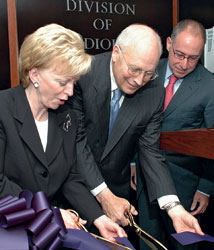
Vice President Dick Cheney and his wife, Lynne, inaugurated the Richard B. and Lynne V. Cheney Cardiovascular Institute at GW on July 20. The Cheneys donated $2.7 million for the new multidisciplinary institute, which seeks to advance research and education of cardiovascular disease.
Dawn Garrott
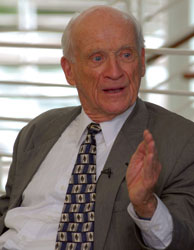
Legendary sportscaster Ernie Harwell reminisced about his career and baseball’s greatest moments during a talk with Mike Freedman, vice president for communications and professorial lecturer in journalism, in The Media and Public Affairs Building on July 15.
Jessica McConnell
|

Elliotts Support International Affairs Education
Lloyd Elliott showed his gentle wit at the recent announcement that he and his wife, Evelyn (‘Betty’), are going to add a substantial sum, $500,000, to their endowment in support of the Elliott School of International Affairs.
“I grew up a wealthy man in the rocky hillsides of Appalachia, so yes, it’s a lot of money for me,” quips the man who rose from humble beginnings outside Charleston, W.Va., to become president of The George Washington University, serving from 1965 to 1988.
The couple expresses their love for GW through their existing endowment of $1.2 million, which is designated to the “Elliott Fund.” The endowment’s formal title is the Evelyn E. and Lloyd H. Elliott Fund in support of the Gaston Sigur Professorship and other Elliott School activities.
The provisions of this gift “are that the income should be used as the dean and the faculty decide,” Elliott says. “One year this may support a professorship, another year something on similar lines, but maybe a graduate assistantship for a student, or a scholarship.”
Michael E. Brown, dean of the Elliott School, expressed his gratitude for the couple’s commitment.
“Lloyd and Betty Elliott have made countless contributions to The George Washington University—in a multitude of ways extending over more than four decades,” Brown says. “At the Elliott School of International Affairs—the school that proudly bears their names—we are deeply grateful for their continued involvement in our current programs and plans for the future….This gift to the Elliott Fund will ensure that the school will continue to be one of the best and one of the most dynamic schools of international affairs in the world.”
As a former president who excelled at fund raising, and is perhaps proudest of finding support to establish three libraries, Elliott weighed how to set up his own endowment for GW.
“I’ve seen too many gifts to institutions become kind of hamstrung by the conditions that the donor puts on them,” Elliott notes. “And yet most donors don’t want to just give it and walk away at midnight, so that’s what we are trying to do—to designate the course of the use of the income, but leaving it in the hands of the people closest to the work—the dean and the faculty.”
—Jeannette Belliveau

Cancer Gala Honors Outstanding Supporters

|
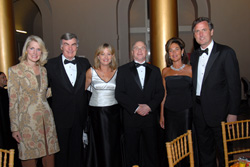
Pictured from left: Jan Smith with husband Sam Donaldson, 2006 Spirit of Life Honoree; Kim Patierno with husband Steven Patierno, executive director of the GW Cancer Institute; and Margaret Bush, 2007 Spirit of Life Honoree, with husband Marvin Bush.
|
The historic National Building Museum, opulently decked in golden hues, provided the backdrop for the fourth annual GW Cancer Institute Gala on April 14.
The principal benefactors for the evening, Dr. and Mrs. Cyrus Katzen and Dr. and Mrs. Bernard Katzen, who have been ongoing supporters of the Cancer Institute since its inception, were recognized and thanked for their unending support. Overall, more than 400 supporters of the GW Cancer Institute gathered to celebrate individuals who have been instrumental in the fight against cancer.
Other 2007 honorees included former Senator Connie Mack and his wife, Priscilla, who both received the Cancer Advocacy Award; community activist Ray Michael Bridgewater, who received the Cancer Compassion Award; and first lady of the Republic of Panama Vivian Fernández de la Torrijos, who received the Distinguished Public Service Award.
The fifth annual GW Cancer Institute Gala will be May 3, 2008.
|